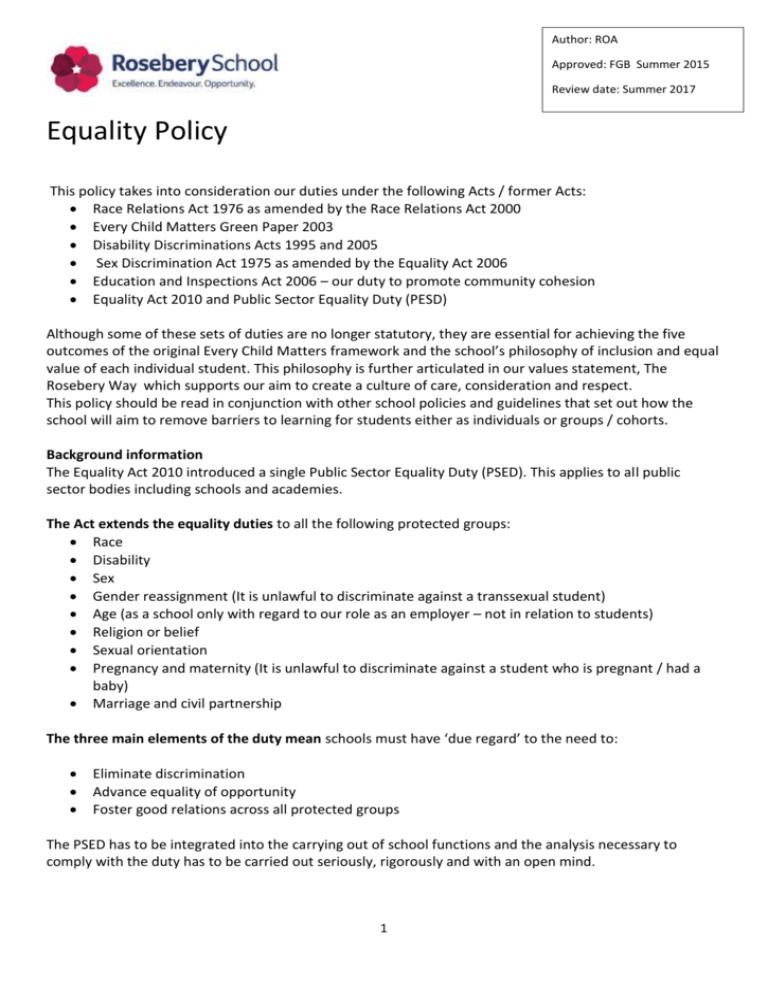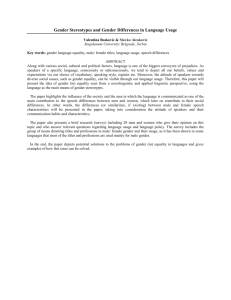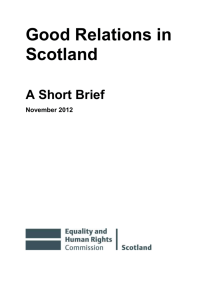Equality Policy - Rosebery School
advertisement

Author: ROA Approved: FGB Summer 2015 Review date: Summer 2017 Equality Policy This policy takes into consideration our duties under the following Acts / former Acts: Race Relations Act 1976 as amended by the Race Relations Act 2000 Every Child Matters Green Paper 2003 Disability Discriminations Acts 1995 and 2005 Sex Discrimination Act 1975 as amended by the Equality Act 2006 Education and Inspections Act 2006 – our duty to promote community cohesion Equality Act 2010 and Public Sector Equality Duty (PESD) Although some of these sets of duties are no longer statutory, they are essential for achieving the five outcomes of the original Every Child Matters framework and the school’s philosophy of inclusion and equal value of each individual student. This philosophy is further articulated in our values statement, The Rosebery Way which supports our aim to create a culture of care, consideration and respect. This policy should be read in conjunction with other school policies and guidelines that set out how the school will aim to remove barriers to learning for students either as individuals or groups / cohorts. Background information The Equality Act 2010 introduced a single Public Sector Equality Duty (PSED). This applies to all public sector bodies including schools and academies. The Act extends the equality duties to all the following protected groups: Race Disability Sex Gender reassignment (It is unlawful to discriminate against a transsexual student) Age (as a school only with regard to our role as an employer – not in relation to students) Religion or belief Sexual orientation Pregnancy and maternity (It is unlawful to discriminate against a student who is pregnant / had a baby) Marriage and civil partnership The three main elements of the duty mean schools must have ‘due regard’ to the need to: Eliminate discrimination Advance equality of opportunity Foster good relations across all protected groups The PSED has to be integrated into the carrying out of school functions and the analysis necessary to comply with the duty has to be carried out seriously, rigorously and with an open mind. 1 Specific duties under Public Sector Equality Duty 1. Publish information to demonstrate how the school is complying with the PSED. This information must include, in particular, information relating to people who share a ‘protected characteristic’. 2. Prepare and publish equality objectives. Guiding Principles These guiding principles apply to all members of our school community: Principle 1: All learners are of equal value We see all learners and potential learners as of equal value and will endeavour to ensure their learning needs are met through an increasingly personalised curriculum. Principle 2: We recognise and respect diversity Treating people equally does not necessarily involve treating them all the same. Our policies, procedures and activities must not discriminate, but are appropriately differentiated to take into account the differences of life-experiences, outlook and background, and in the kinds of barriers and disadvantage which people may face. Principle 3: We foster positive attitudes and relationships, and a shared sense of cohesion and belonging Our policies, procedures, ethos and curriculum, both formal and extra-curricular, aim to promote and develop positive attitudes between staff, student, parents, our local community and increasingly our national and global communities. Principle 4: Our staff recruitment, retention and development policies will be non-discriminatory We take seriously our responsibility to ensure our policies and procedures are non-discriminatory and give equal opportunities to all members or potential members of staff. Principle 5: We aim to reduce and remove inequalities and barriers that already exist. In addition to avoiding or minimising possible negative impacts, we actively seek to implement strategies to enable all members of our community to make the most of their learning and personal / professional development. Principle 6: We consult widely We recognise the importance of listening to the views of our staff, students, parents and other stakeholders actively seek their opinions through channels such as staff/ student voice activities and the use of more formal consultations. Principle 7: Society as a whole should benefit We intend that our policies and activities should benefit society as a whole, locally, nationally and internationally, by fostering greater social cohesion and by encouraging all members of the school community to make a positive contribution to community life. Action 2 We recognise that a policy is only of use if it results in positive action. Each year the School Development Plan (SDP) is reviewed and specific actions are agreed. We seek to embed the principles of the Equality Act in this document namely through defining objectives which: Ensure all learners can achieve Secure all learners' entitlement to personal development, welfare and well-being Encourage excellent attendance for all students Advocate a range of teaching styles and strategies to meet the needs of all learners Create a partnership with and encourage participation in the life of the school by all parents, carers and guardians Ensure a fair and transparent approach to behaviour, discipline and exclusions Facilitate equal access to the school site and the curriculum for all students. Addressing prejudice and prejudice-related bullying The school is opposed to all forms of prejudice and bullying and there is guidance in the Anti-Bullying Policy on how such incidents should be dealt with. Religious observance We respect the religious beliefs and practice of all staff, pupils and parents, and comply with reasonable requests relating to religious observance and practice. Roles and Responsibilities The Governing Body Governors are responsible for ensuring that the school complies with equality legislation and that this policy and related procedures are implemented. The Headteacher The Headteacher is responsible for implementing the policy and for ensuring all staff are aware of their responsibilities and are given appropriate training and support. The Headteacher must also act in any cases of unlawful discrimination. The staff All staff are expected to: Promote an inclusive and collaborative ethos. Deal with any prejudice or bullying that may occur according to school guidelines. Identify and challenge bias and stereotyping in the curriculum. Support students in the class for whom English is an additional language. Keep up to date with the law on discrimination and take up training and learning opportunities. Staff development and training We ensure that all staff, including support and administrative staff, receive appropriate training and opportunities for professional development, both as individuals and as groups or teams. Monitoring and evaluation 3 To meet the requirements of the Equalities Act 2010 we publish information and data required by the Equalities Act 2010 within the school’s Self Evaluation Framework (SEF) and specific objectives within the School Development Plan. Further sources of evidence of our adherence to the Equality Act 2010 include: RAISE on-line Anti-bullying Policy Assemblies School Development Plan Exclusion figures Accessibility Plan Curriculum Plan SMSC Audit document Pupil Premium Impact Report Provision mapping for SEND International schools visits 4











